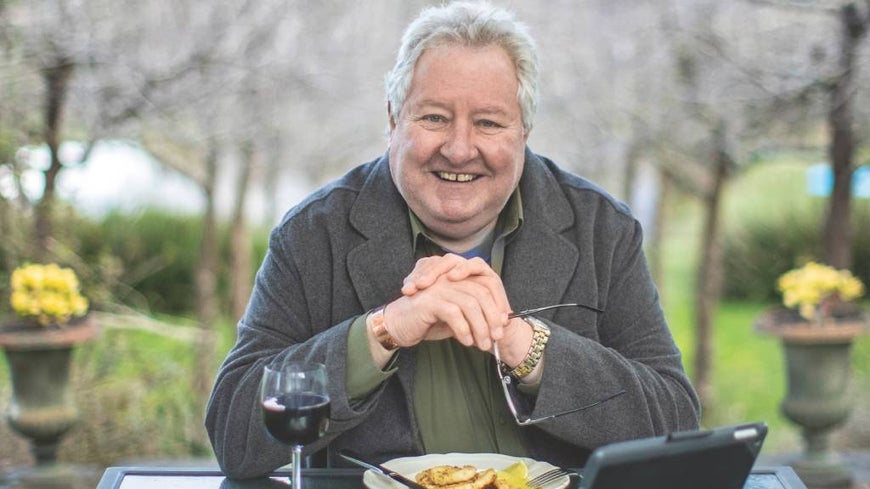Out of the Woods

Written by Pip Harry for Australian Seniors
With more than 50 years in the business, John Wood has appeared in a string of hit TV shows, including a 13-season run as senior sergeant Tom Croydon in police drama Blue Heelers, which won him a Gold Logie in 2006. Earlier this year, he was treading the boards in David Williamson’s new play, The Great Divide.
Alongside his acting career, John manages rheumatoid arthritis – an autoimmune disease where the body’s immune system attacks the lining of the joints, causing pain, swelling and stiffness. “I’ve had rheumatoid arthritis for about the last 15 years and it slows you down,” John admits. “It’s always very painful. But at the moment, it’s not too bad. I guess you get used to it as time goes on.”
The first signs were sore and swollen ankles. “I had quite severe pains in the ankles and difficulty getting around. I started to notice it in the hands; my knuckles were really swelling up and the hand was very difficult to move.” Around the same time, John was diagnosed with gout, a form of arthritis that occurs when uric acid starts to form crystals in the joints. “I had an MRI done and my hand was full of uric acid.”
With a zest for the theatre, John hasn’t let his diagnosis slow him down – except on rare occasions.
“I auditioned for the Harry Potter musical and they had us marching up and down and across and sideways and doing all sorts of stuff and that was all fine, then this associate director from England said, ‘Now I want you all to fall down’. And I said, ‘I can’t even get on the ground to play choo-choo trains with my grandkids, it’s a big mistake getting me to fall down’. He said, ‘Never mind, fall down anyway’. So, I fell down and I had to be helped up by actor Julie Forsyth and a couple of other women.”
John takes prescribed anti-inflammatory and uric acid reducing medications for his arthritis and gout, plus herbal supplement curcumin and pain relief. He’s also taken up walking through water and regular walking. “I’m staying at Kirribilli [in Sydney] now, and it’s a bloody long walk up to the shops at Milsons Point. I’m getting fitter. I was walking at a pool – it’s great exercise because it’s 1.2 metres deep, a heated pool and the water takes a bit of weight off the joints.”
It hasn’t been an easy road, but John has managed to stay positive – relishing steady and fulfilling acting work, alongside raising daughters Meg and Lexie, and now enjoying his grandchildren. “The arthritis is mainly under control and I’ve been managing to stay working for most of the time.
“When Blue Heelers came to an end, I was massively disappointed. It had been 12 years of just having to drive into the city and do the show and be on a pretty good wage. But I’ve been working in the theatre pretty much all my career now. I can’t imagine what I would do if I stopped acting.
What the physio says
Rod Grof, physiotherapist and director of Platinum Physio, offers the following tips for John and anyone tackling the pain and stiffness of rheumatoid and osteoarthritis, and other age-related ‘wear and tear’.
“There are some great non-pharmacological interventions for rheumatoid arthritis. One of them is hydrotherapy, which is exercising in warm water at approximately 34°C,” he says. “A targeted workout will address the muscles, tendons and ligaments affected by rheumatoid arthritis, to help improve things like flexibility.”
Although rheumatoid arthritis isn’t curable, Rod says it can be managed with exercise, good sleep, nutrition, easing stress, having a good lifestyle and through yoga, meditation, and mindfulness. “I always say this: if there was a pill for exercise, every single doctor would be prescribing it.”
Rod also recommends hitting the gym. “Physio-supervised exercise takes a patient through a tailored exercise regime which addresses whatever their deficits are. I believe when it comes to musculoskeletal related conditions, go straight to your physiotherapist. Here in Australia, you don’t need a referral, so it’s very accessible.”
He also believes musculoskeletal surgery, such as joint replacements, should be a last resort. “Typically, these operations have around a 15-to-20-year lifespan. Education, exercise, weight loss, is number one. The next phase is looking at things like injection therapy, taking pain relief, anti-inflammatory medication. If that’s still not giving you the quality of life that you’re after, that’s when you look at having joint replacements.”
As we age, we should also focus on balance: “In over 65s, balance is a big issue: one in three people over the age of 65 fall. Improving your muscle strength, your level of physical activity and balance will go a long way and ensure that you’re living a healthy lifestyle.”
Get the latest take on trending issues, smart tips to boost your financial goals, or a fresh way to indulge in everyday joys, all from the comfort of your favourite reading spot with DARE magazine from Australian Seniors.
DARE also features exclusive stories from some of Australia’s favourite personalities.
Listen to John Wood talk to James on Life's Booming in series 5 Is This Normal?
8 Aug 2024